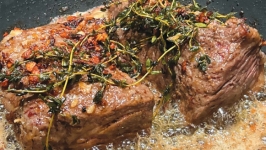Dr. Sheila Patinkin of Vermont Wagyu at Spring-Rock Farm
Explore the hills above Springfield, and you slowly travel back to the 19th century. Beautifully maintained farms, well-tended pastures, stately homes, handsome barns. Horse-drawn carriages would not be out of place. This rural community along Parker Hill offers a glimpse of Vermont the way it used to be. Yet the black cattle grazing the verdant pastures of Spring-Rock Farm embody the 21st century: full-blood Wagyu carefully selected for superior genetics and raised with the utmost care to ensure the richly marbled beef coveted by chefs and gourmands alike.
Dr. Sheila Patinkin, steward of Spring-Rock Farm since 2006, serves as president of the American Wagyu Association. Read on to learn how this unassuming powerhouse evolved from physician to farmer, simply by coming home to her roots.
What drew you back to Vermont from Illinois?
Sheila Patinkin: My husband died unexpectedly in 2005, and I was absolutely grief-stricken. My kids were young adults and doing their own things. I was a pediatrician outside Chicago and decided to move back to southern Vermont to be closer to my own four siblings. I wanted to find a property where I could eventually retire and share it with my own kids and their families. I found this beautiful 1790 farm in the hills above Springfield in 2006. It just felt right.
Tell me about your family roots here.
SP: My grandparents had a farm outside Putney, about 20 miles from here, and my family would spend summers there. My dad put up an old circus tent where all five of us kids would sleep. My parents wisely had their own adjacent tent. Those were magical summers! We eventually moved from outside Boston to Springfield, and I graduated from the local high school. My brother, Dan Crocker, now runs a large-scale sugaring operation on my grandparents’ farm.
How did you decide to start a Wagyu beef farm? That’s an impressive leap from pediatrics!
SP: I wanted to put cattle on the land to graze and remediate these 250 acres of pasture. My cousin who lives in Montana raises Wagyu beef, and he encouraged me to consider that breed. He thought Wagyu would be a perfect niche product for Vermont. And as a genetics research geek, I loved the concept of raising full-blood animals. But they were hard to find in 2007. I finally sourced 20 embryos from Washington State and Oregon, put them in surrogate cows back here in Vermont, and got 10 calves. So the herd started in 2008 with those 10 calves, and the breeder from Washington State sold me seven more cows.
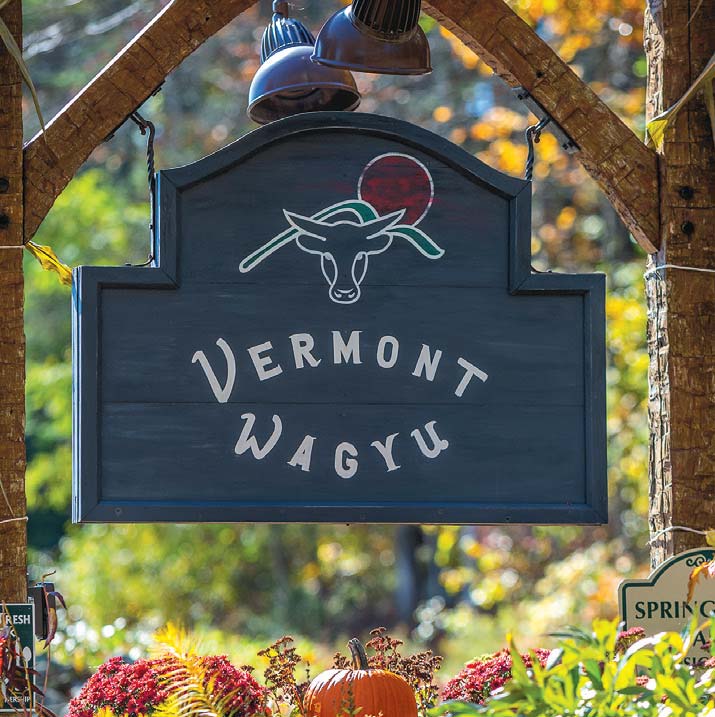
“I wanted to put cattle on the land to graze and remediate these 250 acres of pasture. My cousin who lives in Montana raises Wagyu beef, and he encouraged me to consider that breed. He thought Wagyu would be a perfect niche product for Vermont.” –Dr. Sheila Patinkin
What’s the backstory on Wagyu coming to America?
SP: The first 120 Wagyu cows were flown from Japan to the United States in the 1990s. Australia bought their starter Wagyu cows from the United States. Everything evolved from that original herd.
I know you have a passion for genetics, so explain what “DNA parent-verified” means. Here’s your chance to geek out for us!
SP: Every animal registered in the American Wagyu Association is DNA-verified, and that’s what full-blood Wagyu means. Farmers who register their full-blood animals with the AWA draw a DNA sample when the calf ’s ear is pierced for the tag. That sample is submitted to the AWA’s third-party lab, which matches all the markers in the DNA to the cow’s dam and sire. This means the AWA can parent-certify through DNA every calf that’s registered. The AWA is proud to have a full DNA trace from calf to dam to grand-dam and great-grand-dam, all the way back to the original Wagyu nose prints, aka fingerprints, from the cows that came to the United States from Japan in the 1990s.
Describe your operation and how it’s evolved during the past 16 years.
SP: When I started, I didn’t really have a clear plan. I knew I wanted the cows but hadn’t really taken marketing into consideration at the time. Fortunately, with Wagyu, it takes close to four years to raise and finish an animal you’re going to sell for beef. You have to get an embryo or breed the cow, wait for the calf to be delivered, then raise it to maturity. Overall, it takes 25 to 29 months before a Wagyu cow is ready to be processed.
And then came the marketing?
SP: I started making cold calls to chefs in New York and Boston who might be interested in this high-end, luxury meat. It was not my forte, but I did it because I had to.
Chef Michael Anthony at Gramercy Tavern in New York City said he would give me 10 minutes, so I drove down with two big bags full of beautiful photos but no meat because it wasn’t ready yet; 45 minutes later, he agreed to buy a side of beef. And then, he kept buying from us. I would pick up sides of beef from the Springfield packing house and drive them down to Manhattan. Other chefs got on board, and off we went.
“I started making cold calls to chefs in New York and Boston who might be interested in this highend, luxury meat. It was not my forte, but I did it because I had to.” –Dr. Sheila Patinkin

Three-quarters of Sheila’s family at the October 2022 Vermont Wagyu Auction
There seems to be increasing interest in and demand for Wagyu beef.
SP: In 2007 or so, there were fewer than 5,000 pure-bred Wagyu in the United States. However, more farms are now registering their cattle with the AWA. We are one of the top 10 full-blood Wagyu beef farms and distributors in the country. Most of the farms are out west or in the south.
How did the pandemic impact your business?
SP: We lost the majority of our restaurants when the lights went dark in March 2020. That was beyond scary. Fortunately, Jes Lockerby, my sales and marketing manager, and I had started e-commerce in November 2019. We had the template laid out and gotten our feet wet, but we had to get super creative when the pandemic hit in order to source supplies such as boxes, dry ice, and insulating liners. It was a huge learning curve, but we got through it. It was wild and kind of fun. We had tons of customer service calls and questions about how to cook the beef. People started ordering steaks from us to prepare at home because they weren’t dining out anymore. Fortunately, the online sales haven’t slowed. We’ve gone from one walk-in freezer to three, and counting!
What has public response been?
SP: We get great reviews on Yelp, Yotpo, and Klaviyo, with comments such as “Best beef I’ve ever had,” “Excellent customer service.” The positive word of mouth has been incredible from chefs and consumers alike.
We are one of the top 10 full-blood Wagyu beef farms and distributors in the country. Most of the farms are out west or in the south.” –Dr. Sheila Patinkin
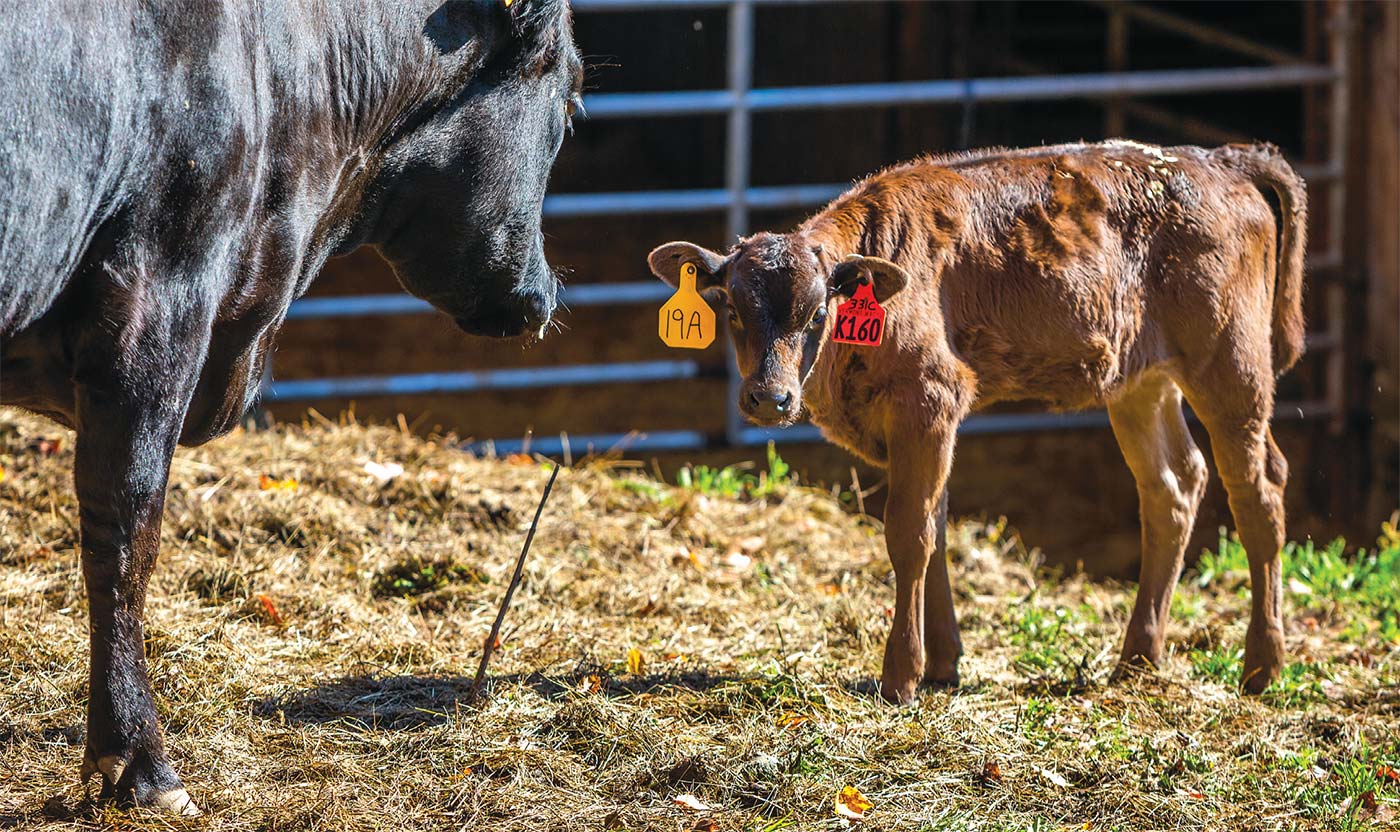
Although typically black, Wagyu cows can also be ruddy brown, as we see in this young calf.
What are some top sellers?
SP: Ribeye, New York strip, Denver chuck, and tomahawk—that’s popular for special events and birthdays.
Perfect segue—what distinguishes Wagyu from other beef?
SP: The rich marbling. That’s what makes the meat so flavorful and tender. The genetics dictate the quality of beef, and we breed our cows for the genetics that ensure the highest quality cuts. There’s no Japanese style of meat grading in the United States. The top grading in USDA is prime, and our Wagyu is well above that, more like a super prime.
Have you traveled to Japan to experience Wagyu there?
SP: Yes, I was invited to join the Australian Wagyu Association travel group in 2012. We toured Wagyu farms, and the trip was timed to coincide with the Wagyu Olympics, which happen every five years. Growers take such pride in how they present their animals, all shampooed and brushed and decorated with their farm’s colors much like Kentucky Derby horses and jockeys. There’s a livestock show in the big stadium tent, and then the steak contests. So the event focuses on both genetics and taste.
Tell me about your team.
SP: Roger Osinchuk started as our veterinarian in 2006 and became our livestock manager in 2014. As he says, he’s in charge of everything that keeps the cows alive, healthy, and out of the road. That’s important in our rural community! He focuses on their feed program and rotational grazing. He’s a vet and I’m a pediatrician, so we both understand animal health and genetics. Jackie Fox is my office manager; she’s been with me the longest. Jes came on in 2018, and she and I manage all the sales and shipping. We’re all a great team because we trust and respect each other, and that means we can question and debate ideas. There’s no hierarchy—we simply work together to make the best possible decisions for the animals, the land, and the business.
You also employ a lot of local people.
SP: I feel incredibly responsible for taking care of my workers, and I’m happy to have a positive impact on the local economy. It’s really a family atmosphere here: everyone pitches in because we all want to keep this farm thriving.
Do you envision expanding your business?
SP: We have two products: the genetics, aka the livestock, and the meat. Our meat program has become increasingly significant to the operation. And we sell some of the premier genetics in the world. The land and management practices dictate the size of our herd. I’m comfortable with this level. It feels right for our land and our team.
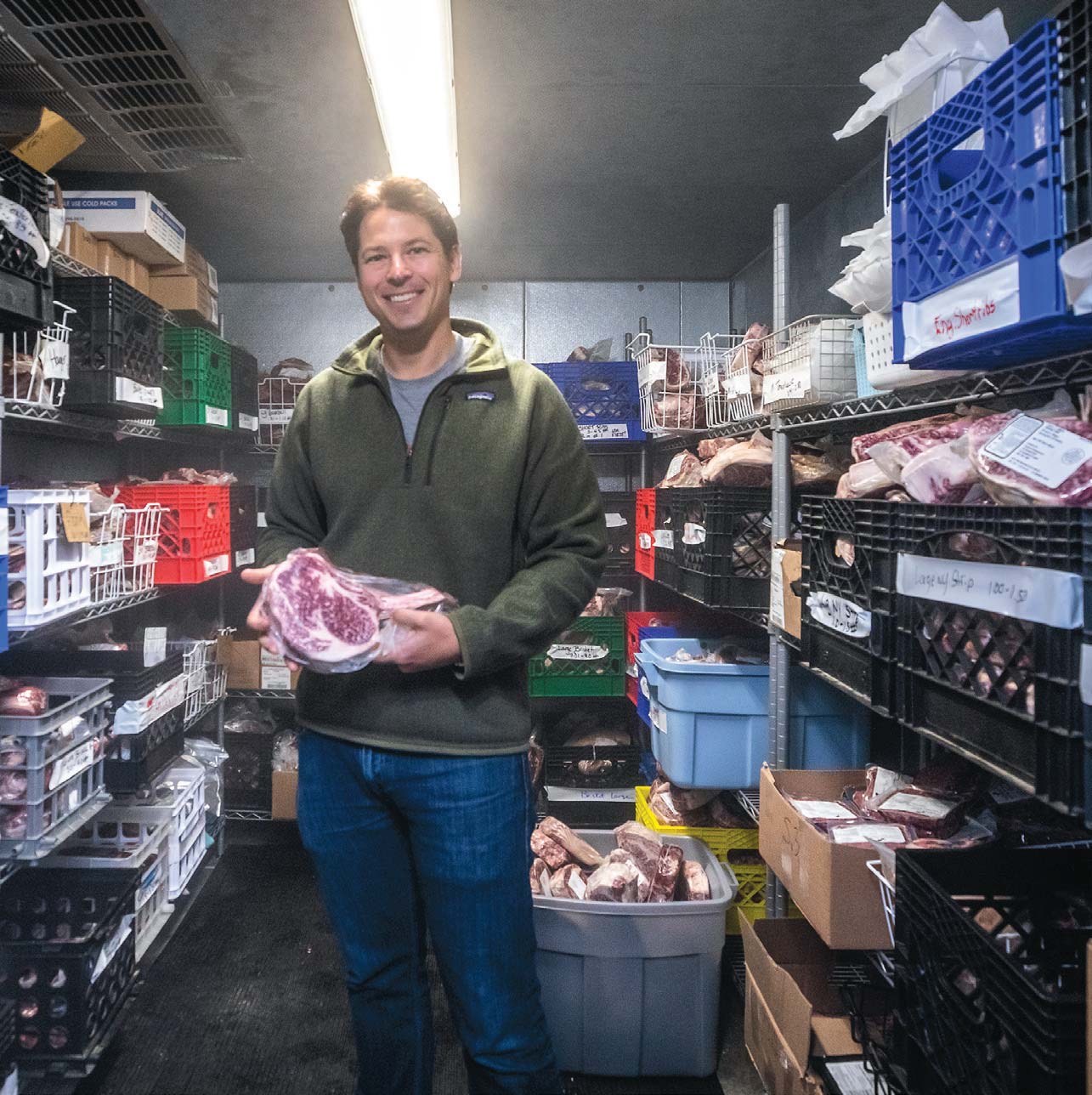
Sheila‘s youngest son Max, responsible for Vermont Wagyu‘s ecommerce operations, proudly displays a richly marbled ribeye.
What skills from your previous career carry over into farming?
SP: Everything you’ve done in your past bears influence on who you are today and the decisions you make. As a pediatrician, I cared for babies; on the farm, I care for calves. My passion for genetics arose from my pediatrics research where I did a lot of chromosomal studies. Now I apply that knowledge and data management to livestock.
What other traits serve you well as a farmer?
SP: I didn’t come from a cattle background. I had to prove to others, including my own kids, that I knew what I was doing. But I’m pretty determined and a problem-solver, and I like to create and build. The daily challenges motivate me. And exhaust me!
What are some of the challenges?
SP: To keep our genetics at the premier level. To have good sires that thrive, that are feed-efficient, that marble well. And to keep the calves alive in Vermont winters. I once had to take a calf born in extreme cold in to the steam shower to warm her up. I sat on the floor with her for an hour. She pulled through, got up, and teetered off. We called her Popsicle, and she now has a calf.
And the joys?
SP: This is an operating, real-life farm, and I get to share these treasures with my family, especially my grandkids.
Any closing words of wisdom?
SP: Something happens every single day that makes me laugh or shake my head at this life I’ve chosen to lead. I’m proud that I’ve been able to build this business, as a woman in a man’s world. The bottom line is that Vermont Wagyu would not be where it is today without my family behind me in trying times, an incredible team, the land on this historic farm that we steward, and some truly amazing Wagyu cows.
“This is an operating, real-life farm, and I get to share these treasures with my family, especially my grandkids.” –Dr. Sheila Patinkin
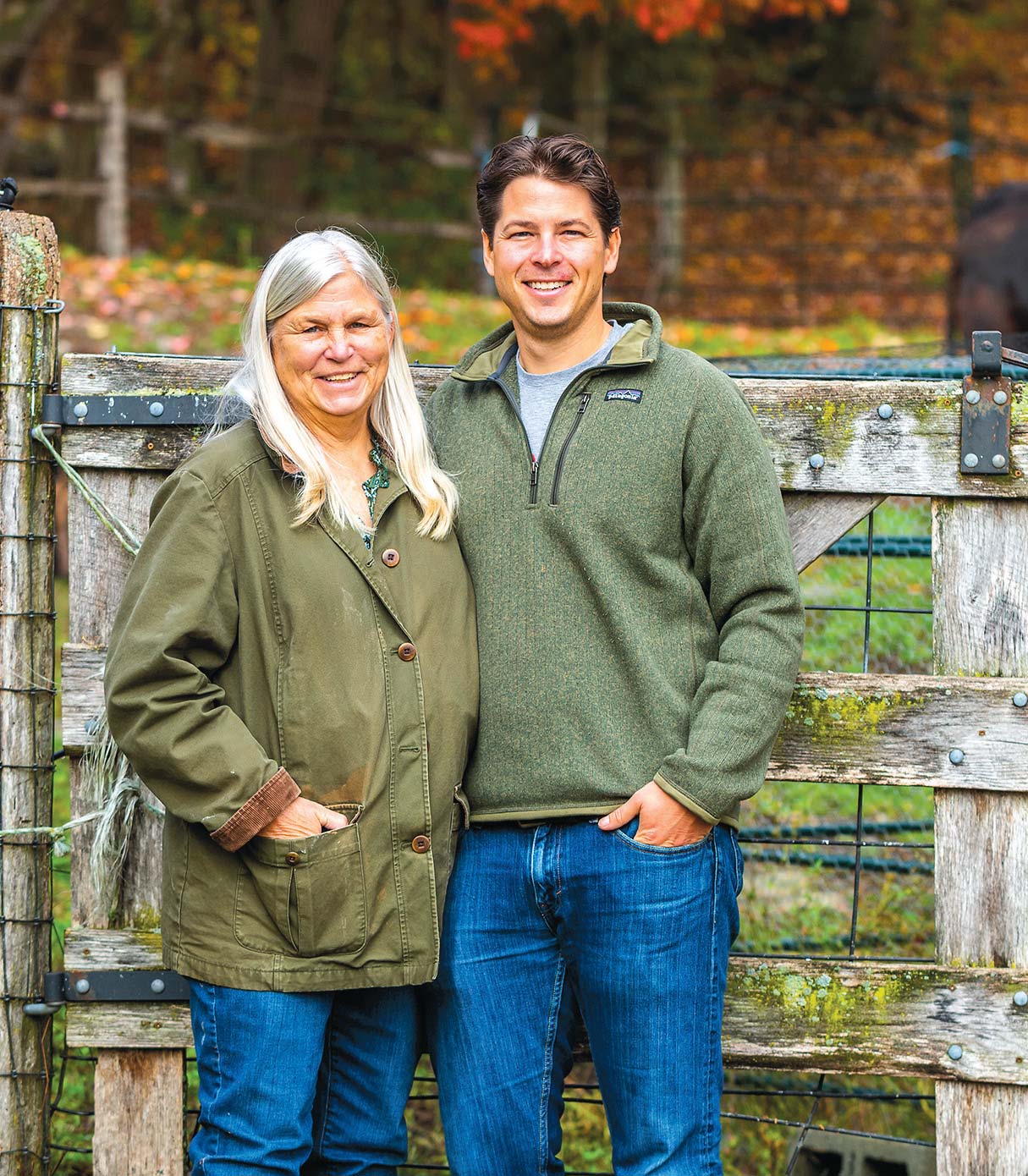
5 RAPID FIRE QUESTIONS FOR DR. SHEILA PATINKIN
Breakfast today?
A Thomas’ English muffin with Ploughgate butter and a mug of coffee.
Favorite childhood meal?
Something my family called “Putney Special.” It was passed down from my mom from her childhood camp experiences. Peanut butter toast with stewed tomatoes on top. It sounds terrible but I loved it!
Cake, pie, or cookies?
Ginger molasses cookies.
Guilty pleasure in food or drink?
Sweets. I have a real sweet tooth.
Late night or pre-bed snack?
Ice cream: vanilla chocolate chip or mocha chip.



